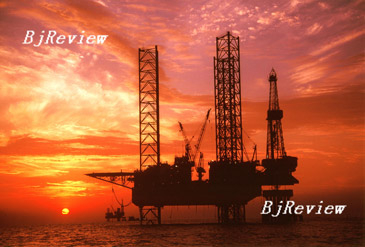
Each step China takes in overseas energy exploration is difficult-there is huge resistance. This occurred when China National Offshore Oil Corp. (CNOOC) announced plans to explore for gas and oil in Iran. The strange thing is that the strongest opposition arose not in the two concerned nations but from a third party that is thousands of miles away, the United States.
On December 22, 2006, a CNOOC official indicated that the company and the National Iranian Oil Company signed a memorandum of understanding on the development of the North Pars gas field, which contains an estimated 80 trillion cubic feet of natural gas, according to the document.
The project involves an investment of more than $16 billion, of which $11 billion will be spent on the downstream refining and processing segment and the rest on the upstream exploring segment. According to the preliminary agreement, the gas from the field will be liquefied and divided equally between the two companies.
The project is expected to take eight years to bear fruit, and under the terms of a planned agreement signed as early as October, the National Iranian Oil Company offered CNOOC a 25-year gas supply from the North Pars field.
That caused an immediate and strong reaction in U.S. political circles. Tom Lantos, a California Democrat who is chairman of the House International Relations Committee, said his panel will "closely examine" the deal to see if it triggers a 1996 law, the Iran and Libya Sanctions Act, which prohibits foreign firms that invest more than $10 million in Iran's energy sector from raising capital in American financial markets. Lantos said the committee would scrutinize whether the sanctions apply, because the U.S. law aims at starving Iran of funding for terrorism and nuclear weapons.
Lantos warned that if China follows through with a signed agreement, there is a high possibility of harsh punishment.
Undoubtedly, China has the obligation to follow United Nations regulations, but it has no obligation to follow U.S. laws. America threatens to sanction China in accordance with its domestic law, which means that the United States is placing its domestic law above international law.
There is no necessity to fear the Iran and Libya Sanctions Act. This law has prompted a strong protest from European countries that have close energy ties with Iran since the day it was passed. It has never been used; thus French newspapers have dubbed it a "scarecrow." The second year after the law was passed, the French oil company Total, in association with Russian and Malaysian companies, signed a contract with Iran valued at $2 billion, which was considered a public challenge to the law. French former Prime Minister Lionel Jospin even criticized the United States on public occasions, saying that U.S. law applies only in America, not in France. On this issue, the European Union has supported Total.
Assessing risk
In any case, the China-Iran agreement is still worth thinking about. Overseas enterprises should pay attention to the risk of intervention from a third party. If one party in a trade relationship between two countries is considered a real or potential enemy by a third country whose political or economic power exceeds that of the two trade partners, then the risk of third party intervention exists. If this third party is a trade opponent of either of those partners, then the risk is even higher.
| 